To commemorate his theatre group, Ansh turning 21 and staging over 40 plays, Makarand Deshpande releases a limited edition book. Select excerpts from an interview
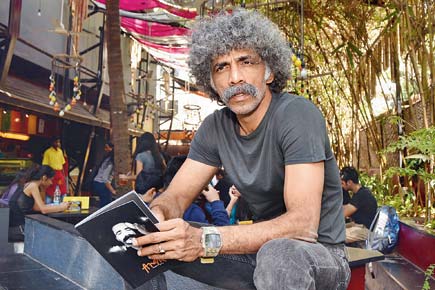
Makarand Deshpande at Prithvi Theatre
![]() Q. How did the idea of the book come about?
Q. How did the idea of the book come about?
A. It was long overdue. People would tell me to publish a book with my scripts. We started doing that with our festival. Then people told us to at least give us snapshots or glimpses of our journey. At the festival, we had plastered Prithvi with photos and long banners of Ansh over the years including our plays from 1993-94 to 2015. That's when I felt it should become a book. We had 40 plays with different themes. People don't remember some of the older plays so we thought of compiling the synopsis and cast of each play. We were excited to source the photographs. We wanted to include our technicians and other support, including music directors like Vishal Bharadwaj, Shailendra as well as classical music artistes. We have included actors, set directors from then until this generation. You can find all of this on Google but we have given it an imagery of the kind of work we've done over the years.
ADVERTISEMENT
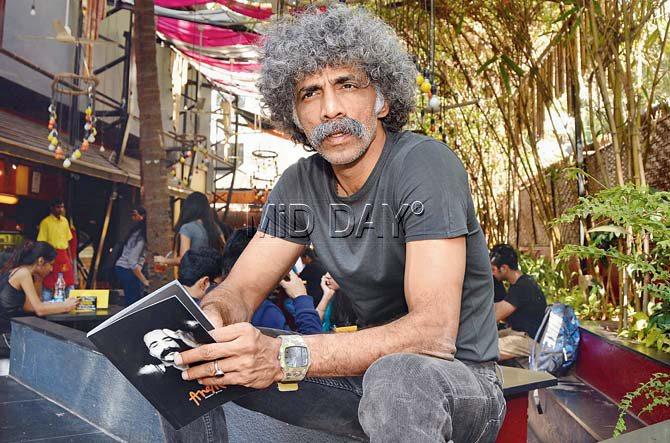
Makarand Deshpande at Prithvi Theatre. Pic/Sayyed Sameer Abedi
Q. What was Ansh's first play?
A. Intially, we didn't have a group name. I would perform in inter-collegiate events from NM (College), for practically every competition. I did plays in Hindi, Marathi, English and Gujarati. This landed me roles in TV series and films. I wanted to perform at Prithvi so I performed with the group I used to act with earlier. I remember doing Madhyam in 1992-93. Officially, we did Jungle ke Bahar with Kay Kay (Menon), Sanjna (Kapoor) and then I did the Sadhu Vasvani biopic. Then we had to name the group for technical reasons. I call Dream Man my first play. At that point, we all had dreams. Mumbai was called the city of dreams. Actors came from everywhere, and Prithvi was the centre for trained and untrained actors. There would be a show every Saturday and Sunday.
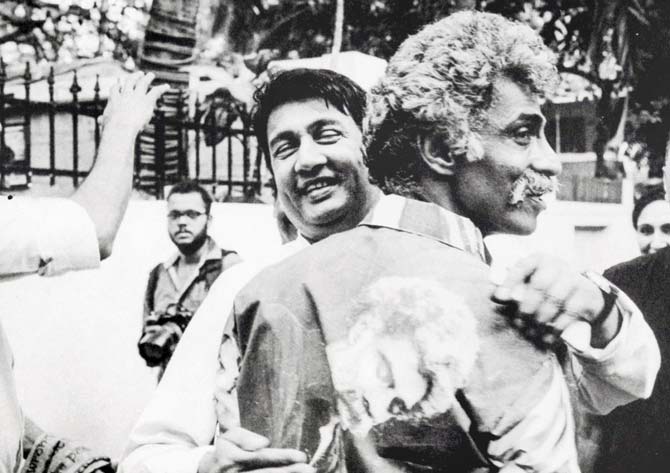
Makarand Deshpande with actor Shekhar Suman
Q. When did you realise you wanted to write?
A. I was on a film set and I was very bored waiting. I didn't enjoy gup shup (chattting). I had a lot of energy, which I had to use so I started writing. Then since I wrote it I had to make it. I had done a lot of amateur theatre so I had confidence. I didn't want to succeed or achieve so I wasn't scared of failure. You have to be able to afford your whims and fancies. Theatre is my whim and fancy and slowly it became my life.
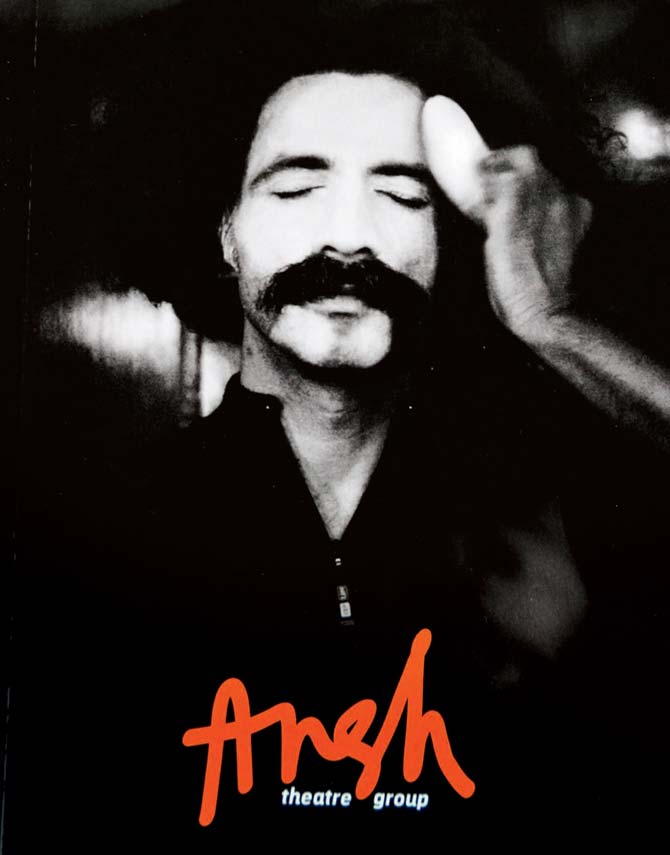
Ansh, Theatre Group. Rs 125. The book is currently available at the Prithvi Book Store
Q. What are the momentous events in Ansh's journey?
A. One is when I started writing. Then I started disliking my writing as a director. Then I decided to do Tagore's Chitra in English. It was a dance drama. That was a turning point. I started writing again then. I wrote Airavat about Ganesha's birth. It brought Satyadev Dubey in my life. He had also wanted to make a play about Ganesha's birth. He saw it and discussed lot of thinks with me and it was a very deep association and lasted till he left us. Sir Sir Sarla, which I made because I wanted to make a play that everybody understands, was also a landmark event in Ansh's journey.
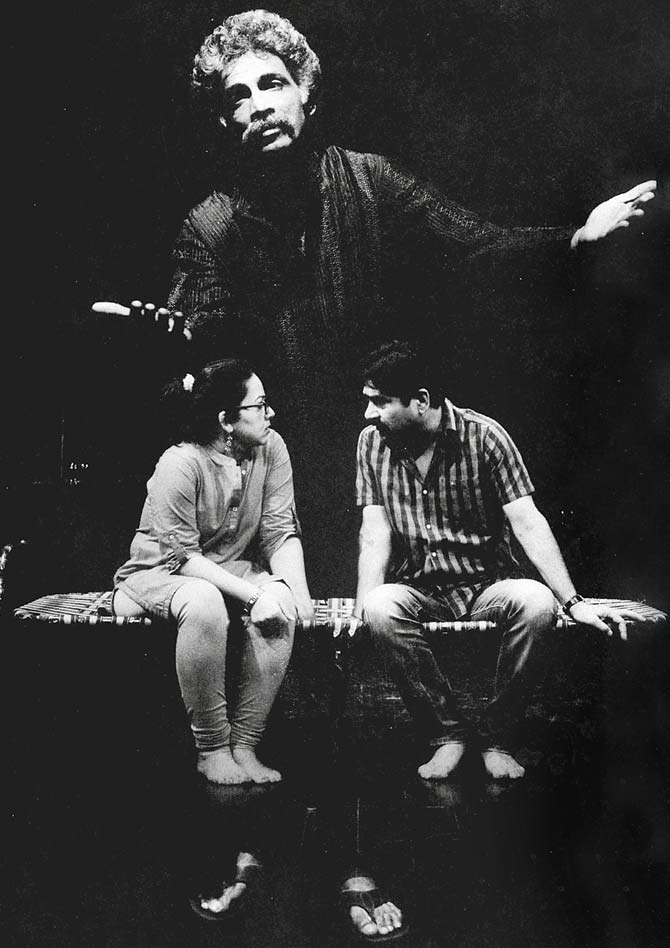
A still from the play Karodo Mein Ek
Q. Your initial plays were abstract while the newer ones are human interest stories. Why?
A. Yes, it has changed. For the last few years human stories have inspired me more. There are outbursts of madness in between where I do crazy things. Life is funny. It can be cruel at times. It moves only ahead. People keep trying to hold on to memories but that's harmful more often than not. I would like to capture all of this.
Q. Tell us about your next play.
A. I'm writing one about the fear we have within us about being Hindu or Muslim. I have put that fear in a family and I want to see what happens. It's a story about a father and son. Even in a heavy-duty play there's some amount of humour. I don't like sensationalism. I don't want to shock people. I don't want to say derogatory things about religion. I want to talk about what happens as a result of that fear.
Q. Are you still learning?
A.It's more of realisation now than learning. I'm not here to show off but to create an impact. I've learnt to slow down. I am more flexible. Each performance should have a tinge of something fresh from today and not the staleness of yesterday's performance.
Q. Which of your oldest plays have been running the longest?
A. Ek kadam aage and Sir, Sir Sarla, for 15 years. Though the caste has changed, the impact remains. We opened this festival with Sir, Sir Sarla and people enjoyed it.
Q. You have ten plays running currently, how do you manage?
A. I don't know from where people come! They handle backstage. I have some principal technicians like Teddy Maurya, our technical director, Hidayat Sami, Shailendra Barve and others. Whenever we announce a play and actors come. I have to organise money and I do that.
Q. How do you pick a cast?
A. From people I know and someone I've seen and people who can commit time. When people ask can I join I say I am rehearsing come. Then if the timing works it does.
Q. Writer, director, actor which role do you enjoy the most?
A. Nowadays I'm enjoying acting, originally it as writing. That's where the thinking begins and then transits and then the audience gets stuck in your world. I enjoy that.
Q. What do you think of alternate venues like malls to do plays?
A. Malls and cafes may be good for fringe theatre. I personally prefer a theatre for plays. I can convert any venue into a theatre but given a choice I prefer a venue like Prithvi. It's fantastic when I am at Prithvi. It is so intimate that the performance level is sublime. You don't realised when art has seeped into life and life has seeped into art, there's that much harmony.
Q. What is the scene for Marathi theatre like?
A. Marathi theatre has an audience that watches an 11 am show, 4 pm show and even late evening shows. The experimentation has reduced in Marathi theatre, I feel. It is more commercial. Pune might have some.
Q. What recent play did you like?
A. Watching Naseeruddin Shah play Einstein was a delight.
 Subscribe today by clicking the link and stay updated with the latest news!" Click here!
Subscribe today by clicking the link and stay updated with the latest news!" Click here!






